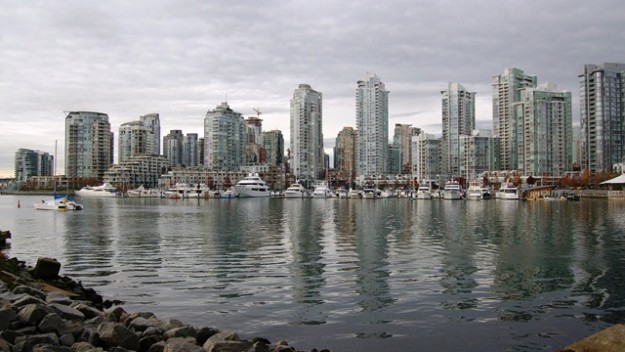It may be the Four Seasons, but when you walk into the lobby of this particular hotel, it’s clear to see that winter has finally arrived; more specifically, it’s beginning to look a lot like Christmas. Over the course of the holiday season, visitors and guests of the hotel will find the main lobby of the Four Seasons Hotel Vancouver filled with Christmas trees, part of the Festival of Trees, an annual event that showcases trees donated by organizations in support of the BC Children’s Hospital Foundation. The hotel hosts the festival every year, a popular favourite falling second only to the Crystal Ball (also in support of the hospital), an event which raised over $1.1 million for the hospital in 2012 alone.
While residents of Vancouver may know the Four Seasons to be actively involved in supporting the local community, they may not know that the hotel is also a model of sustainable practices within the hotel industry. Undertaking large scale endeavours like planting 10 million trees around the world in order to offset carbon emissions, the chain has a reputation for adhering to the golden rule –”treat others as you would want to betreated”– and it shows.
“It’s how we make this bond. Like the festival of trees, we’ve been doing it for 26 years. It’s a community development, we try to give back to the community” says Priyan Jayetileke, the Director of Engineering at the Four Seasons Hotel Vancouver . Earlier this month, BizEnergy got some one-on-one time with Mr.Jayetileke for an inside look at one of only thirty-six hotels in the world to have been awarded 5 Green Keys by the Green Key Eco-Rating Program. Tackling energy-efficiency through innovative heating solutions and tracking software, staff engagement, and sustainable dining options, this is one hotel that will, hopefully, have others turning “green” with envy.
Modest beginnings and just rewards
While being “green” has always been a large part of corporate policy at the Four Seasons, the big push came when hotels bid to host the “Greening the Hospitality Industry Conference” in 2008. “We bid on it and they chose us,” says Jayetileke, “a team came and wanted to follow the entire life-cycle of a can of coke, from restaurant to recycling facility.” Needless to say, Jayetileke and his dedicated team successfully passed the test.
Leading up to and following the conference, the hotel started looking at how they could expand on existing green policies in order to be an industry leader in sustainability. The logical first steps included further engaging the staff in “green” policy making, a task which, according to Jayetileke was seamless, thanks to habits and behaviours cultivated by existing hotel policy: “Part of the new employee orientation is talking about sustainability, recycling and energy savings; they might have an idea that we haven’t thought of. We have an open door policy here; anyone can talk to anyone, about anything, anytime.”
Today, the Four Seasons Hotel has a “green” committee that meets once a month: “Together we do a walk through to see which areas are doing well. If all the recycle and compost bins are full, all the food waste goes into the garbage; that’s unacceptable. We have to do regular audits to make sure things are running smoothly.” When asked whether or not management is involved with the “green” team, Jayetileke laughed and gave a big nod. “They all know me,” he said, continuing to tell us how he walks through the building every day to ensure that things are running smoothly. When asked about staff turnover, the Director of Engineering simply shook his head: “Our hotel has over 5000 years in experience. It’s one of our biggest strengths.” (Read more about How to get your staff on-board with sustainability in the workplace).
Making every kilowatt count
The pride and joy of the Four Seasons Hotel Vancouver (and what Jayetileke refers to as his “baby”) is the ENBALA (formerly Sempa) Power Networks Hybrid Heating system, installed in 2009. Jayetileke was working at both the Four Seasons Hotel in Whistler and Vancouver when he decided to replace the propane gas fueling the hotels -transported from Squamish to Whistler- with electric boilers. Jayetileke starting by installing two boilers in Whistler in 2006, a project that cost over $250,000 and saw an astonishing one year payback. One year later he added a third boiler in the residence and the hotel has since seen a savings of over 1.5 million dollars.
 Being an older building, the biggest challenge to installing the boiler in Vancouver was finding the place to put it: “They had to install it on the 4th floor and it was one of the best things that they did,” said Jayetileke. “The boiler was installed in 2009 and in the first year, we saved 967 tonnes of greenhouse gasses, the equivalent of removing 270 Honda Civics from the streets. By 2010, we had saved 25% of the greenhouse gases used in previous years.”
Being an older building, the biggest challenge to installing the boiler in Vancouver was finding the place to put it: “They had to install it on the 4th floor and it was one of the best things that they did,” said Jayetileke. “The boiler was installed in 2009 and in the first year, we saved 967 tonnes of greenhouse gasses, the equivalent of removing 270 Honda Civics from the streets. By 2010, we had saved 25% of the greenhouse gases used in previous years.”
To complement energy-saving efforts, the hotel invested in energy tracking software like Pulse Energy, a program that lets you know how much energy you are using every minute of every day, taking into consideration things like occupancy and providing comparative graphs that allows you to adjust your usage according. They also use i-Vu, a software that provides the interfaces necessary to access and control single, multi-building, or global network of buildings that share data and control.
Keeping waste away from the landfill
The same year of the “Greening the Hospitality Industry Conference”, the Greater Vancouver Regional District banned certain items from entering the landfill and issuing a large fine for establishments that didn’t comply. As mentioned by Jayetilek, recycling became a priority for everyone, including the staff at the Four Seasons Hotel Vancouver. Nowadays, the hotel diverts a significant amount of waste from the landfill by recycling things like glass, plastic, paper, cardboard and newspaper materials as well as harmful products like batteries, paints and fluorescent light bulbs. Through its efforts to minimize waste since 2008, the hotel has recycled enough material to fill 5,676 full-sized pick-up trucks. Jayetileke, however, has his sights set even higher; he hopes the hotel will produce zero waste in the next few years.
Sustainable dining at YEW Restaurant
 Last, but definitely not least, Jayetileke was kind enough to share a bit about sustainable dining at the well-known YEW Restaurant & Bar. A member of the Green Table Network (an organization created by foodservice professionals for foodservice professionals to promote best sustainable practices) and Oceanwise (a non-profit dedicated to the conservation of aquatic life) the YEW Restaurant and Executive Chef Ned Bell are very proud to offer sustainable seafood as well as locally sourced produce – most of the time.
Last, but definitely not least, Jayetileke was kind enough to share a bit about sustainable dining at the well-known YEW Restaurant & Bar. A member of the Green Table Network (an organization created by foodservice professionals for foodservice professionals to promote best sustainable practices) and Oceanwise (a non-profit dedicated to the conservation of aquatic life) the YEW Restaurant and Executive Chef Ned Bell are very proud to offer sustainable seafood as well as locally sourced produce – most of the time.
Jayetileke admits that one of the complications when it comes to mixing local with luxury is serving up what high-paying customers want to eat while trying to source produce grown in the region. In an effort to save on some of the energy costs required to transport ingredients, Chef Bell does keep an herb garden in the kitchen. Bell, who adheres to the philosophy “globally inspired and locally created”, was kind enough to take a second out of his very busy schedule to show BizEnergy around his work space and share his enthusiasm about sourcing local cuisine.
Full steam ahead at the Four Seasons Hotel Vancouver
So, what’s in store for the future of the Four Seasons Hotel Vancouver? Well, if things are left up to Jayetileke, there’s still a whole lot of work to do; and he’s not stopping until it’s done. What’s #1 on the to-do list for this busy Director? “Lighting”, says Jayetileke.
In 2008, the Four Seasons Hotel Vancouver partnered with BC hydro to replace all exit signs with LED bulbs and implement variable speed drives in an initiative called Power Smart. Unfortunately however, when asked whether or not LED lights had been introduced throughout the entirety of the hotel, Jayetileke said that because of such strict design guidelines, it is difficult to find a colour that is able to maintain the feel of the room. He happily revealed however, that some new products created by Philips will eventually allow the team to replace lights in the guestrooms, ballrooms and hallways (there are a few CFL lights in the ballrooms, however the payback on implementing similar lights in the guestrooms is much longer). The next step come 2013, will be to tackle lighting in both the lobbies and the driveway.
Other long-term goals include the previously mentioned desire to reach zero waste and better planning during the lead up to big banquet functions where food waste often exceeds the number of bins on hand.
All ready to book your room at the Four Seasons Hotel Vancouver? Here are some additional things to keep in mind:
- See that recycle bin that says “we do the recycling for you”? Throw whatever you want inside, because it’s true; the hotel staff separate every bin that comes down from the guest rooms so that guests don’t have to.
- Look for a sign on the bed asking you if you wouldn’t mind waiting until the 3rd day to change the bed linens. Follow the instructions. Honestly, how dirty could they be?
- Enjoy those Bulgari bathroom amenities. They aren’t as green as the could be but the leftovers get donated to charity.
Questions or comments about the Four Seasons Hotel Vancouver? Visit the hotel website or leave them below!



















